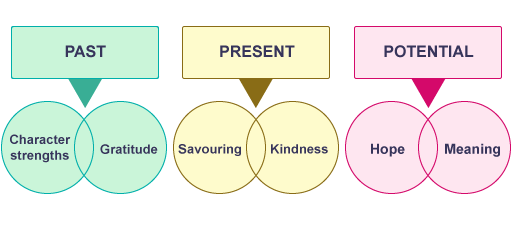Use 'Print preview' to check the number of pages and printer settings.
Print functionality varies between browsers.
Printable page generated Saturday, 28 February 2026, 12:59 AM
Unit 1: Introduction
Course introduction
Welcome. This course has been designed to support you in using evidence-based insights from positive psychology to improve the wellbeing and happiness of you and your family.
This is of particular relevance given the short- and long-term effects on families living through and recovering from the COVID-19 pandemic.
During this course you will develop your understanding of six key themes from positive psychology and learn practical techniques to develop positive approaches to explore your past, present and potential wellbeing.
 Learning Outcomes
Learning Outcomes
After studying this course, you will be able to:
- Understand some of the key themes in positive psychology
- Identify some of the evidence-based benefits of positive psychology approaches
- Apply some practical techniques to improve you and your family’s mental health, particularly whilst recovering from the pandemic
- Access further information to develop and deepen your understanding of this topic.
1.1 What is positive psychology and how can it help with wellbeing in the home?
Positive psychology is a branch of psychology that investigates how all of us can live happier and more fulfilling lives.
Despite its name, it is not just about being positive all the time and it certainly can’t offer a permanent state of bliss. However, it can improve your wellbeing and help you and your family feel a bit happier at home.
Its success is also based on using scientific research to provide techniques that are proven to help people to flourish.
 What positive psychology has to offer
What positive psychology has to offer
In the video below, Michelle Tytherleigh, a positive psychology researcher from the University of Chester in the UK, discusses what positive psychology has to offer families.

Transcript
1.2 What you can expect from the course
The video in section 1.1 highlighted that positive psychology has identified ways to boost happiness and wellbeing.
Throughout the rest of this course, you will be introduced to some of the ways you can boost your happiness and wellbeing, and that of your children, using six key themes that have been shown to improve wellbeing through the way we think about the past, present and future potential.
These six themes are illustrated in the diagram below.
For each of the themes introduced in the course, you are shown some practical activities that you can try at home. The benefits of these have all been supported scientifically and can be attempted by yourself during the course. They can also be adapted to work with children of all ages within the home. Being a good role model to our children is also a great way to help enhance their wellbeing.
Using these techniques can help you focus on improving relationships within the family and having a more optimistic outlook when imagining the future. It can also help you to build on your personal resilience and have a clearer sense of your purpose and meaning in life (Lyubomirsky, 2006).
It is strongly recommended that you have a notepad or a journal to hand during the period that you take this course. You may find it very helpful to reflect on how you have found certain activities and you may want to take notes about ideas and resources that you can use in the future.
We hope you find the course interesting and that you are inspired to try some of the practical ways to boost happiness and wellbeing in your home.
1.3 Meet the authors
This course has been produced by a research team from the University of Bolton, the University of Chester, and The Open University.
Claudine McFaul

Claudine is a practising counsellor and positive psychologist and teaches at The Open University. She has a particular interest in researching how positive psychology interventions can be applied in community and therapeutic settings.
Ian Platt

Ian works with school children of all ages as Project Lead for the Hummingbird Project at Medequip4Kids. He has previously worked with adults recovering from depression and his particular area of interest is improving mental health provision and access to higher education for children from underprivileged backgrounds.
Michelle Tytherleigh

Michelle is a Senior Lecturer in Psychology and University Teaching Fellow at the University of Chester. Her research interests allow her to bridge these two roles in academia by looking at how positive education can empower students towards success and wellbeing.
1.4 Further support
 The Samaritans
The Samaritans
Phone: UK and ROI: 116 123
Email: jo@samaritans.org
The phone number is free to callers from landlines, mobiles and payphones and does not show up on itemised phone bills.
 Nightline
Nightline
Phone: UK 020 7631 0101
Email: listening@nightline.org.uk
Nightline is a confidential listening and information service run by students for students which operates through the night. Operating hours are mainly in line with term times at campus universities. Callers to the Hotline outside of hours will receive information about the Samaritans and a contact number to call.
Students outside of UK are recommended to use Skype to phone for free or Instant message
(Skype): chat.nightline or Skype Phone: londonnightline
The service has a related email service which operates alongside the hotline all year round. Students contacting the service by email will receive an answer within 48 hours.
 Mind
Mind
Phone: 0845 7660163
Email: info@mind.org.uk
Mind provides advice and support to empower anyone experiencing a mental health problem. It campaigns to improve services, raise awareness and promote understanding.
 Mental Health Foundation
Mental Health Foundation
Since 1949, the Mental Health Foundation has been the UK’s leading charity for everyone’s mental health. With prevention at the heart of what they do, the Mental Health Foundation aims to find and address the sources of mental health problems so that people and communities can thrive.
1.5 Summary
In this first unit you have learned that this course is designed to support you in using evidence-based insights from positive psychology to improve the wellbeing and happiness of you and your family.
Positive psychology investigates how all of us can live happier and more fulfilling lives. This is of particular relevance given the short and long-term effects on families living through and recovering from the COVID-19 pandemic.
In the next unit we introduce you to six key themes that have been shown to improve wellbeing through the way we think about the past, present and future potential.
Now go to Unit 2: Character strengths, where you explore the first of our six principles.

